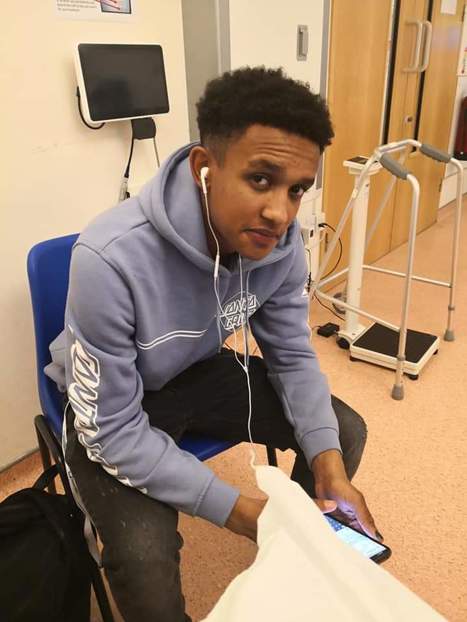Inquest into the death of Jade Hutchings, aged 18
A coroner concluded that failings by West Sussex County Council contributed to the death of 18-year-old Jade Hutchings of Haywards Heath.
Posted on 07 October 2022
In a narrative conclusion, Senior Coroner Penelope Schofield said there were missed opportunities by a number of services to proactively engage with Jade to ensure that he was being encouraged to address his dependency on alcohol and drugs.
She identified notable failures by West Sussex County Council, including the failure to assess Jade’s needs in a Child in Need review before he turned 18; the decision to close his case prematurely; and the failure to refer him to the Transitions Panel. This all resulted in a gross failure amounting to neglect.
Jade died on 23 May 2020 following an attempt to take his own life on 21 May, during the coronavirus lockdown. His suffered a severe brain injury and despite treatment, it was found he would not survive.

Jade Hutchings.
Jade had dropped out of college in 2019 and lost his job. The coroner said that Jade, who was vulnerable, had been struggling with his mental health and had been using alcohol and drugs to mask underlying issues. He had been finding it difficult to engage with services to address this.
In September 2019 Jade was allegedly assaulted and kidnapped and was placed on West Sussex County Council Children’s Services caseload. He later confided in a doctor that he had attempted to take his own life around this time. Sussex Police suspected that Jade may have been vulnerable to county lines drug exploitation. His social worker encouraged Jade to self-refer to an alcohol and substance misuse service or seek a referral through his GP.
Jade’s social worker also made a referral for Jade to REBOOT, a Sussex early intervention youth programme intended to engage with 10 to 17-year-olds before they become entrenched in crime and violence. However, the inquest heard that REBOOT were unable to assist 17-year-olds at that time, potentially due to inadequate resourcing.
A Child in Need plan was in place for Jade, but in November 2019 his file was closed without review or consultation with the family and without ensuring that Jade’s referrals had been made.
In Jade’s care notes the social work manager, Paula Black wrote ‘Case is to close – Jade should seek support from GP and as he is nearly 18 has to take responsibility as an adult for his behaviours and actions’.
In December 2019, Jade was arrested with two other young people on suspicion of aggravated burglary. A joint strategy risk assessment meeting was held which raised concerns that Jade may have been used to recruit others into gang activity. West Sussex County Council Children’s Services did not attend the meeting, without giving a reason, and the coroner said this was another missed opportunity to revisit Jade’s case before his 18th birthday.
Jade then went to his GP for help and was asked to return for a follow-up appointment a fortnight later, but Jade did not make the appointment.
However in January 2020 he did make an online self-referral to Time to Talk (TTT), an NHS talking therapy service in West Sussex. The adviser called Jade seven minutes after the time specified, he did not answer the phone and Jade’s case was closed. No voice message was left for Jade and the TTT discharge letter stated he could self-refer again if needed.
In February 2020 Jade attempted to take his own life. Doctors made a s.12 Mental Health Act 1983 assessment and concluded that Jade was not suffering with a mental health disorder and that his issues were caused by alcohol. The doctors told the coroner they had expected Jade’s GP to follow up to explore Jade’s reports of physical symptoms including constant abdominal pains and migraines that made him ‘feel low and contemplate suicide’. The coroner concluded that as the s.12 assessment form did not make this an express requirement of the GP, there was no failure in not following up with Jade.
In the same month, Jade’s behaviour at home began to escalate and he started to attend sessions with his mother’s renal psychotherapist and counsellor. Jade scored high on the measure for Post Traumatic Stress Disorder and began Eye Movement Desensitisation and Reprocessing therapy. However face-to-face therapy sessions were stopped because of the coronavirus lockdown.
On 20 May 2020 Jade emailed his counsellor asking to speak to her as soon as possible. An appointment was scheduled for that evening, but he did not attend.
Later that day Jade told his mother he was popping out but when he did not return home she reported him missing.
Sussex Police raised Jade’s risk as a missing person from low to medium once they became aware of his age, previous self-harm and struggles with mental health, and that he was intoxicated at the time he had left home .
Officers found Jade in Hastings the following morning but had not been told about his vulnerabilities or increased risk rating and decided he was not in need of immediate care and control and did not need to be detained under s.136 Mental Health Act 1983.
As Jade did not present as acutely intoxicated or suffering from a mental health incident the coroner found no failings in the Sussex Police officer’s decision making on 20 May. However, the inquest heard that the officers who attended Jade and returned him home the following day had received very limited mental health training. There was also a lack of clarity about the function of an out-of-hours ‘Haven’ mental health service run by Sussex Partnership Foundation NHS Trust (SPFT) and available to the police.
Later on 21 May 2020 Beatrice went shopping with her daughter and when she returned she found Jade had attempted to take his own life. He died two days later.

Jade Hutchings and Beatrice Hutchings.
The coroner intends to issue a Prevention of Future Deaths Report for Sussex Police to improve their mental health training and ensure that this is rolled out to frontline police officers. The report will also ask that Sussex Police provide greater clarity to their police officers about the ‘Haven’ service and what type of support it can offer, and to address the possible resourcing issue for their REBOOT service.
The coroner indicated that a decision on a prevention of future deaths report on social services would be made in six months, after West Sussex County Council had its next Oftsed inspection and had time to report on an ongoing piece of work that related to her concerns about support for cared-for children transitioning to adulthood. She recognised the positive steps taken by the council since Jade’s death.
The coroner will also keep under review whether a report is required for SPFT once she has reviewed further internal policy papers, to ensure that the trust’s interpretation of ss.135 and 136 Mental Health Act 1983 are correctly understood and addressed in documents relating to their multi-agency service available to Sussex Police.
The coroner will write a letter of concern to Sussex Police about the battery life of Body Worn Video equipment, which the inquest heard means that Sussex Police officers cannot comply with their own police policy on its use.
Following the conclusion of the inquest at Horsham in Sussex, Beatrice Hutchings issued a statement. She said:
“Jade was my beautiful son. He was loved by all his family; his sister, dad and me. Jade had a bright future ahead of him, with so much to look forward to.
“At a critical time in Jade’s life, his mental health started to worsen, and he began to turn to drugs and alcohol. This increased his vulnerability and exposed him to dangerous situations. Jade bravely called for help but we didn’t realise that he would be expected to keep knocking on a door that was repeatedly closed to him.”
“West Sussex County Council Children’s Social Services’ work with Jade, when they were independently assessed as failing, was short-lived and ended abruptly before his 18th birthday. There was no Child in Need Review or any consultation with Jade or us. Jade found it incredibly frustrating and difficult to get help from the NHS, which made him feel isolated and caused him to suffer more.”
“I honestly believe that all the time that Jade was in contact with the NHS and Social Services, he was not given the help he needed to address his mental health issues. He was not allowed to be a vulnerable young person. Instead he was viewed as a troublesome black male with addiction issues, who needed to take responsibility for himself.”
“What this inquest has shown is that the systems in Sussex are not fit for the purpose of protecting vulnerable young lives. There are gaps in Social Services for children with identified needs, who are then unable to get help from Adult Social Services. There are issues with communication between doctors, patients and other services, and, in the case of the police, there is clearly a lack of training around mental health issues and a failure to cascade safeguarding issues to frontline officers.”
“I feel affirmed by the coroner’s finding that Jade’s death was contributed to by neglect. I am glad that the coroner has shone a light on where there was a lack of support for my Jade and where changes can be made by the services involved. Hopefully this will prevent another family from suffering this type of loss in deeply tragic circumstances.”
Leigh Day solicitor Sandeep Michael, who represented Beatrice Hutchings, said:
"We are pleased that the coroner has conducted such a thorough investigation for Beatrice and her family, and that her conclusion reflects the family’s concerns around neglect. The coroner rightly recognised that this is a case where a series of failings by West Sussex County Council amounted to gross failure, contributing to Jade’s death”
“We welcome the coroner's recognition of the requirement for a Prevention of Future Death Report and hope that steps are taken to close gaps and ensure that the same mistakes made in Jade's case are not repeated.”
“The inquest has brought into sharp focus the constellation of systemic issues determining young people's experiences of mental health and social care. This is particularly so for those whose needs are more nuanced and do not fit squarely within existing provision, and who, increasingly, we see slip through the nets.”
“In order for early intervention to be effective, there needs to be much more clarity, better understanding of mental health conditions and a joined-up approach taken by public services. This of course will entail improved funding and an ownership rather than a shirking of responsibility.”
“The inquest has helped the family to clarify a lot of unanswered questions about the last year of Jade’s life and to ensure that issues such as gaps in provision, inadequate resourcing and training are highlighted and prioritised so that other young people and their families are not failed in the same ways. This has always been the driving force behind the family’s pursuit of this investigation.”



